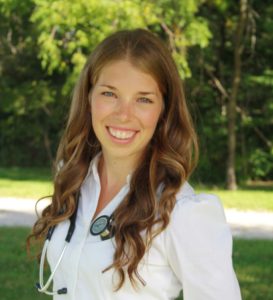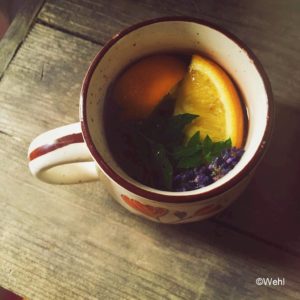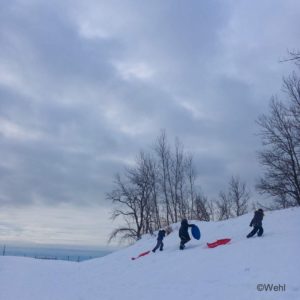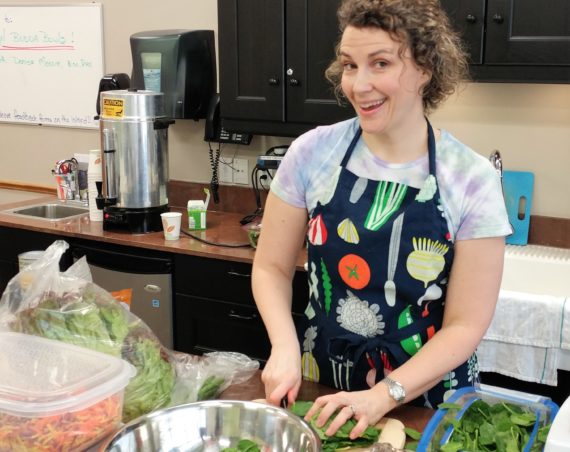Whether you love winter or you’re not a fan, this winter season just might be your best yet thanks to Naturopathic Doctor Janessa Chambers and her tips for optimizing your winter wellness! Dr. Janessa Chambers, ND has a general family practice in Waterloo, Ontario where she loves to take the time to work individually with her patients and play a role in their realization of improved health and wellness!
While winter provides us with beautiful scenery, fun outdoor opportunities and the incentive to cuddle up in a warm blanket with tea and a book, it can present a number of challenges when it comes to staying healthy and energetic. From colds and flus, to dry skin, to energy and mood struggles, we cover it all with Dr. Janessa and learn how Naturopathic Medicine can help us feel our best in the colder months.
 WEHL: Please tell us a little about yourself and what inspired you to become a Naturopathic Doctor?
WEHL: Please tell us a little about yourself and what inspired you to become a Naturopathic Doctor?
JC: I’m a questioner; I’ve always been one to ask questions. As a 6-year old girl, I used to ask inquisitive question after question on car rides with my Dad. I have a very curious nature, and a seeking tenacity, and this has really been one of the driving forces behind my pursuit in helping others in achieving wellness.
Growing up, I was drawn to science and the health care field; I enjoyed working with people, and I wanted to make a significant impact in the lives of others. It was in high school when the seed to pursue a career in Naturopathic Medicine was planted.
I was working reception at a chiropractic clinic and was presented with the opportunity to help a lady overwhelmed by the patient intake process. I got the privilege of sitting down with her one-on-one, meeting her where she was at, and in a supportive way, walking her through that process.
This is very much how I see my role as a Naturopathic Doctor. They are my patients’ own health journeys; I can’t take that from them, nor can I get better for them; they need to assume that responsibility and ownership for themselves. I have the humbling privilege and honour, as a medical professional, to act as a facilitator, using my expertise, gifts, skills, and many years of education, to support and direct them along that journey toward improved health and wellness.
WEHL: What’s your personal philosophy on wellness?
JC: I love this quote by Dr. Randolph Stone (1890-1981), naturopath, osteopath, chiropractor, and the founder of Polarity therapy – a holistic therapeutic approach which facilitates a heightened state of balance within an individual’s energetic physiology.
The quote is as follows:
True health is the harmony of life within us, consisting of peace of mind, happiness and well-being. It is not merely a question of physical fitness, but is rather a result of the soul finding free expression through the mind and body of that individual. Such a person radiates peace and happiness and everyone in his presence automatically feels happy and contented.
One of the principles of Naturopathic Medicine recognizes holistic health as being comprised of mind, body, and spirit. There is undeniably a spiritual aspect to wellness. Health is not just of the physical body, but is the integration of mind and spirit too. I see wellness as a continual evolving journey closely tied in life to purpose. It is a journey of discovery, growth, and expansion. Wellness also relates to proper physiological function.
Another principle of Naturopathic Medicine, in addition to treating the whole person (mind, body, and spirit), is to work with the healing power of nature, the Vis medicatrix naturae. We all have this inherent wisdom within us to heal and to be well – The Vis. Think about the last time you got a paper cut, provided your body had what it needed and you didn’t get in its way, it ultimately healed. This is so much a part of my philosophy toward medicine.
Support the body, and its phenomenal ability to do its thing: to heal, to be well, and address barriers preventing or inhibiting this function (toxicity, malnutrition, inadequate sleep, chronic stress, fixed emotions, mindset etc.). Pathology (disease, disorder, dysfunction) is a disturbance to physiology, and physiology is the way your body works. When physiology is working properly, there’s no room for pathology, it simply can’t exist when physiology is working well!

WEHL: How do you prioritize wellness in your life?
JC: Two major ways that I prioritize wellness are through healthy lifestyle habits and routine and by tuning-in and listening to my body, and trying best to honour and respond to what it’s telling me. There is much care put into what I put into and on my body. And, although my daily morning and evening routines seem to be continually adapting and shifting, I aim to regularly incorporate some form of daily movement, mindfulness, self care, and play, all with an attitude of grace, as “perfect” is not what I’m going for. Life’s very dynamic, and it’s important to be able to flexibly go with that flow and to not get discouraged.
 WEHL: What are your top recommendations for helping us prevent a cold/flu this winter?
WEHL: What are your top recommendations for helping us prevent a cold/flu this winter?
JC: Keep your system strong and correspondingly your immune system in tip-top shape! Yes, you do want to minimize your exposure and limit your risk for contracting illness, but more importantly, it’s about your own susceptibility and keeping your system strong! It means honouring those foundations to health and wellness like proper nutrition, sleep, movement, and mindfulness, and supporting your immune system in doing what it does so well!
As with all general health recommendations, consult with your Naturopathic doctor to discuss specifics pertaining to your health! Health is extremely individualized, and it’s important that you are receiving the care that’s right for you!
Here are a few key considerations:
- Wash your hands often with warm running water and soap!
- Wash your hands after returning home from being out and about
- Occasionally wipe down your cell phone, communal phone, or other regularly handled items i.e. with a cotton swab and rubbing alcohol (careful not to damage electronics)
- If you do run into that cough or the sneezes, make sure to cover your mouth 🙂
- Proper nutrition
- Make sure you are properly nourishing yourself, with whole foods.
- Avoid refined carbohydrate, high sugar processed foods, as they will not serve you.
- Make sure you are receiving appropriate protein amounts and plenty of vegetables!
- Vitamin D Status
- This is our fat soluble sunshine vitamin. Where we live, we simply can’t make sufficient vitamin D from the sun over the fall and winter months; it’s just not feasible. Assistance through vitamin D supplementation during these times, is relevant for most. To optimize this status, and to not get too much, testing is looked at through blood work. As, there is such a thing as too much! Vitamin D toxicity can occur through supplementation. Consult with your naturopathic doctor, to find the safe and optimized dose for you!
 Rejuvenating Rest
Rejuvenating Rest
- Sleep is a time when our bodies rejuvenate, grow, and heal. When it comes to sleep, it’s not simply quantity, but more importantly quality!
- Avoid that screen time before bedtime, and take some time to wind down before attempting to fall asleep (e.g. enjoying a cup of decaffeinated tea before bed, reading, meditating, or deep breathing)
- Sleep in a cool, DARK, place, with your cell phone away from you. If you need to keep your cell phone in the room, get it to the other side of the room, well away from you as you sleep. Also, the darker the better – invest in blackout curtains if need be, and minimize any light exposure from electronics (e.g. Turn around your alarm clock to face away from you at night)
- Movement
- Regular movement is important from a number of perspectives, even from a number of perspectives when we’re specifically looking at immune health!
- Did you know that movement is the prime mover for our lymphatic system? There’s no pump, like the heart, for this system. Moving our bodies, and contracting our muscles through movement act as the pump to keep the lymph properly circulating! Our lymphatic system is closely tied to our immune health. Our lymph circulates throughout the body, carries components of the immune system, and transports to lymph nodes. Lymph nodes are filter stations and sites where specific processes of the immune system are carried out! So, keep movement a part of your healthy lifestyle 🙂
- Match your movement with the current season of your life. For example, if you have a deadline at work that you’ve been stressing about, the kids have a million-and-one things on and are acting up, you just got in a huge fight with your husband, and you are just plain exhausted – currently, running that marathon likely will not serve you nor be in your best interest. You may instead find gentle movements through stretching, a brisk walk, or yoga to be more nourishing and of service to your system.
- Hydrotherapy
- using water’s property of hot and cold delivery, for therapeutic purposes.
- ***Important, these forms of hydrotherapy are NOT appropriate for everyone. Before proceeding, first consult with your naturopathic doctor, or other professional health care provider to talk about the safety and applicability for your individual health!
- Warming Socks
- cotton and wool socks used together, for an overnight treatment, to strengthen and support the immune system, increase circulation, and help with sleep.
- Contrast showers
- using bursts of hot and cold in a strategic way, to invigorate the system and to therapeutically influence circulation.
- Warming Socks
WEHL: If we do end up catching a cold/flu, what natural remedies can we use to speed recovery?
JC:
- Although it’s often inconvenient timing, listen to your body, and rest when you are ill. Foregoing slowing down, can provoke other complications, or cause the illness to linger. Get sick well.
- Contrary to popular belief, it’s actually beneficial and healthy to get sick every now and then. As seen with children, progressing through a healthy management of fever can have progressive effects on their growth and development.
- And on the topic of fever, don’t feed a fever. Make sure to say well hydrated, but it’s okay to respect the absence of an appetite during those times. Appetite suppression occurs, so when you refrain from eating your body can channel its energy and resources elsewhere for fever production. Fasting during a fever also acts to decrease substrates and nutrients (e.g. glucose (sugar), and iron) availability for pathogens, and prevents incomplete digestion from occurring which can lead to increased toxic load. It is important to note, there are specific incidences when a fever is of concern (e.g. very young infants <4mo of age etc.); however, in general, fever is not to be feared, but respected, and managed appropriately.
 To leverage some food as medicine during these times, garlic and bone broths are two of my favourites.
To leverage some food as medicine during these times, garlic and bone broths are two of my favourites.
- Garlic (Allium sativum): in raw form is an antimicrobial herb. This can be a potent fighter in fending off those pathogens! FYI, taken on an empty stomach, raw garlic may cause stomach upset.
- Bone broths/stocks: are gentle, collagen rich and nourishing! You can make them yourself. Especially, when it comes to food prescriptions, be mindful of that sourcing, choosing clean sourcing whenever possible.
- Vitamin C and/or echinacea may also be recommended by your naturopathic doctor for their supportive effects to the immune system.
- Echinacea (Echinacea angustifolia/purpurea) is a medicinal herb used for its immunomodulator, immunostimulator, anti-inflammatory, and lymphatic actions. Remember, just because it’s natural, doesn’t mean it’s safe for you! Medicinal herbs do have drug interactions; consult first with your ND to find out if it’s right for you!
- Vitamin C is a water soluble vitamin; rich in citrus fruits, elderberries, rosehips, kiwi, papaya, broccoli, red peppers, and green leafy vegetables. Supplementing with this antioxidant in double blinded studies, has shown to significantly decrease duration and severity of colds.
WEHL: In winter, we often battle dry skin. What tips do you have for preventing and healing dry skin?
JC:
- The use of a humidifier during the dry winter months can be of benefit.
- Moisturizing with clean products, free of endocrine disruptors, known carcinogens, and other harmful chemicals, can help soothe and protect your skin. Environmental Working Group’s Healthy Living app can be very helpful in finding out more and informing decision making when it comes to choosing your health and beauty products.
- Calendula offincinalis (Marigold) has a long history of use in botanical medicine for skin concerns. The topical application of this herb acts as an anti-inflammatory and a vulnerary – meaning it speeds up healing. You may find the topical use of this herb in the form of a salve or cream.
- Another important consideration is that dry skin may be a symptom of a larger picture when it comes to the state of your health. For example, dry skin is a known symptom of hypothyroidism – or an underactive thyroid. Consult with a medical professional, such as a ND or MD if you think there’s more going on.
WEHL: What types of foods are best for us to eat in the winter and why?
JC: There’s a reason we gravitate toward those cozy warm soups and stews over those cold winter months. From a Traditional Chinese perspective, which is rooted in observations of nature and the four seasons, in general, warming foods such as soups and stews are well suited for those winter months. Here’s why:
We too, follow seasonal patterns, and are influenced by the environmental seasons. With the seasonal variation, those who could get away with lots of ice cream, and raw salads over the warm summer months, may not be able to pull that off during the winter without noticing the effects (loose stools, fatigue, and bloating anyone?)!
Traditional Chinese Medicine (TCM) warming foods are warm in temperature and also in nature, for example ginger is considered warm, in comparison to green tea which is cooling. These foods are easy on the digestive system, and can offer less burden to an already compromised digestive system.
This is only a broad generalization (i.e. If you have a lot of heat in your system, warming foods likely will not work well for your constitution). Consult with your ND, or other health care professional, for specific, individualized advice for you!
WEHL: What is vitamin D, why is it important to get during winter, and how can we get enough of it?
JC: Vitamin D is one of our fat soluble vitamins; it is our sunshine vitamin. Vitamin D has many roles throughout the body, having receptors found in intestinal cells, bone cells, kidney cells, cardiac cells, brain cells, skin cells, immune cells, pancreatic beta cells and more. In fact, higher vitamin D levels are associated with decreased insulin secretion and increased insulin sensitivity. Some of the other functions of vitamin D include importance for calcium homeostasis, cell differentiation, replication, and growth, and immune system modulation.
In adults, vitamin D deficiency can appear a lot like fibromyalgia or chronic pain disorders, as along with bone mineralization defects, deficiency symptoms also include muscle weakness, bone pain, low back pain, diffuse aches and pains, and fatigue.
During the winter months, most of us here, simply don’t get enough. Over the fall and winter months, based on our location in relation to the sun, it’s simply not feasible to make sufficient vitamin D from the sun, regardless of how long you’re outside! That’s where the aid of supplementation comes in as being applicable for most. Also, being obese, having fat malabsorption issues (e.g. greasy floating stools), or being a strict vegan can put you at further risk for vitamin D deficiency.
Within the diet, sources of vitamin D include mushrooms, herring, sardines, liver, beef, egg yolks, and fortified milk. It’s also important to remember that as vitamin D is a fat soluble vitamin, toxicity through supplementation can occur.
Although vitamin D supplementation is warranted for most of us here over the winter, it’s important to get your levels checked through blood work, for safe and responsible dosing! This test, in most cases, is a pay-out-of-pocket test, regardless of whether your medical doctor or naturopathic doctor requisitions the blood work.
 WEHL: How can we optimize our energy and mood during the longer, darker days of winter?
WEHL: How can we optimize our energy and mood during the longer, darker days of winter?
JC:
- Social support, participating in a shared sense of community, and spending time with loved ones. Seek out opportunities to spend quality time with friends and family.
- Get outside and moving daily. Research has shown an increase in liveliness, and a decrease in hostility and depression with time spent outdoors in forested area in comparison to an urban environment. Seek out those trails, and connections to nature. And, throw in that added bonus of movement – with all of those physical activity mood boosting benefits!
- Incorporate play, me time, and time spent with your hobbies. Play and creative expression are tied to good health. Make sure to be spending time in these areas regularly. It can be as simple as a spontaneous 30 second dance party at home, curling up with a good book, or exploring a new hobby you’ve always wanted to try.
WEHL: How can Naturopathic medicine help us improve our wellness, especially during the winter months?
JC: Naturopathic medicine is all about working with the body, supporting the whole you – mind, body, spirit, and soul, through care that’s individualized to YOU! Naturopathic medicine can help to address imbalances and dis-ease, but it also has an important role in keeping people well through maintenance care, prevention, and education!
Especially during those long winter months, working with a naturopathic doctor can aid in addressing root cause and offer tailored support for abundant energy, wellbeing, and a healthy, balanced mood. You don’t need to suffer, especially repeatedly through one of our four seasons!
Within my practice, through medical history taking, physical exam, blood work, accessory laboratory testing when warranted, and energetic testing, I tailor compatible care specifically for you – to meet your current individual indications and requirements!
If there was only one message I could put out there as an ND, I’d want it to be of hope. Through my many years of education and continued learning, it’s become humbly apparent to me, that there’s always more out there. I don’t believe in the rigid one way option, or dead end stop with respect to health concerns. There are always options and avenues to explore when it comes to health improvements and feeling better; even through palliative care, there are measures to reduce suffering and improve quality of life. So, you don’t have to settle with “there’s nothing we can do, you just have to live with it.” No, there are therapeutics that can be implemented to reduce suffering, and to promote wellness progress! You just need to seek it out; there is help out there.
WEHL: What might a first Naturopathic appointment with you look like?
JC: Upon scheduling your first appointment, you are sent patient intake forms through the secure, online, electronic medical record keeping system; they are to be completed before your initial visit. These forms are quite comprehensive, and imperative in getting a thorough and complete understanding of your health history.
The initial visit is 75-90 minutes in length. During this time, I collect more of the puzzle pieces when it comes to your health, and we get started with your treatment.
On our second visit, with the input of additional puzzle pieces (blood work and imaging if applicable, and your progress thus far), we then continue with our health building progress with respect to your comprehensive individualized care! You didn’t get sick over night; noticeable benefits may be seen right away when beginning treatment, but wellness and healing does take time.
The frequency of your visits from that point on depends on your case. However, typically an increased frequency of visits is required at the beginning of care to fully address the initial concerns, and to get you back on track with your health. Afterwards, patients are graduated to Wellness and Preventative Maintenance-Care, and are seen 1-3x/year, for further prevention and to keep them staying well!
For those who have questions, or are wanting to find out more, I also do provide 15 minute complimentary visits, as an opportunity to meet with me, and to find out more about naturopathic medicine, and what I have to offer through my practice.
Connect with Dr. Janessa, ND:
- Web: https://www.drjanessa-nd.com
- Contact: Click Here
- Address: 75 Regina Street North, Waterloo, Ontario, N2J 3A7
- Phone: 519-772-0292
- Wehl Platform: @drjanessand
We invite you to join our all-in-one healthy lifestyle app at Wehl.com!




4 Comments
Dorothy Caldwell
Thank you for such an inspiring interview!! I loved the comment that the best message is one of hope. I, too, always believe that there is an answer somewhere!
Dr. Janessa, Naturopathic Doctor
🙂 Thank-you Dorothy; I’m so glad you enjoyed the interview and found it to be inspiring! Be well:)
Jennifer
Thanks so much for reading and for your kind comment, Dorothy! I’m glad you enjoyed the interview as much as I did! There is so much helpful info and encouragement packed into one article. Dr. Janessa did such a great job and I’m grateful to have a quality resource to read and re-read all winter long 🙂
Kenneth
I really enjoyed this article. So comprehensive and filled with a lot of helpful wellness tips for the winter! I appreciated the guiding principle about wellness being a “continual evolving journey closely tied in life to purpose.” This was a good reminder for me. Thanks Dr. Janessa!